ISSN : 2287-9099
Vol.5 No.4

Abstract
In this paper, a large-scale study on users’ understanding of search-based advertising is presented. It is based on (1) a survey, (2) a task-based user study, and (3) an online experiment. Data were collected from 1,000 users representative of the German online population. Findings show that users generally lack an understanding of Google’s business model and the workings of search-based advertising. 42% of users self-report that they either do not know that it is possible to pay Google for preferred listings for one’s company on the SERPs or do not know how to distinguish between organic results and ads. In the task-based user study, we found that only 1.3 percent of participants were able to mark all areas correctly. 9.6 percent had all their identifications correct but did not mark all results they were required to mark. For none of the screenshots given were more than 35% of users able to mark all areas correctly. In the experiment, we found that users who are not able to distinguish between the two results types choose ads around twice as often as users who can recognize the ads. The implications are that models of search engine advertising and of information seeking need to be amended, and that there is a severe need for regulating search-based advertising.

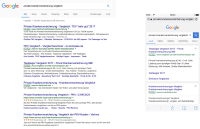
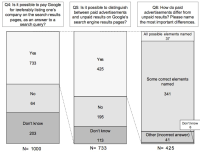
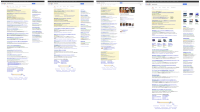
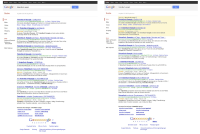
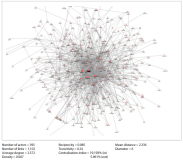
Abstract
Even through many professional organizations increasingly use Q&A sites in their online communities for information sharing, there are few studies which examine what is really going on in the Q&A activities in professional online communities (POC). This study aims to examine the interaction patterns and contents posted in the Q&A site of a POC, KOSEN, a science and technology online community in South Korea, focusing on how actively scientific information and knowledge are shared. The interaction patterns among the participants were identified through social network analysis (SNA) and the contents in the Q&As were examined by content analysis. The results show that the overall network indicated a moderate level of participation and connection and answerers especially tended to be active. Also, there are different interaction patterns depending on academic fields. Relatively few participants were posting leaders who seemed to steer the overall interactions. Furthermore, some content related to manipulation and explanation for experiments, which are in urgent need, seem to be posted in the sites more frequently with more amounts. Combining both SNA and content analysis, this study demonstrated how actively information and knowledge is shared and what types of contents are exchanged. The findings have practical implications for POC managers and practitioners.


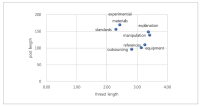
Abstract
This study aims to investigate gender differences in the use of ICT by the students of urban schools. The objectives of the study are to find out the use of computers and Internet by the students and also the problems encountered by them while using computers and Internet. The study found that there is a significant association between the place (p=.005) and frequency (p=.002) of use of computers and gender. It is also found that there are significant differences in the problems faced by students while using computers (p=.002), use of Internet (p=.004), and the gender. This clearly indicates that there exists a gender disparity in the use of ICT by the male and female students in the urban schools. In order to overcome this disparity, the school authority should provide the basic and necessary ICT infrastructure in schools which can be equally used by male and female students.
Abstract
This article assesses the recent development of libraries in Myanmar and efforts to build the sector’s capacity leading up to and after the first democratic elections held in the country in nearly 50 years, at the end of 2015. Cyclone Nargis in 2008 is viewed as a ‘framing event’ (Birkland, 1998) that led to national legal and policy reforms, an increase in national and international projects to support development of Myanmar libraries, and the strengthening of local actors including the Myanmar Library Association to coordinate and lead development activities. Although in need of modernisation, networking, and professional skills, the existence of a widespread number of all library types across the country provides an important foundation for further development. The current status and readiness of libraries is explored in the broader context of the rapid leap from limited to more widely available access to information and technology. The article finds that there is great potential for libraries in Myanmar to support the continued transition to democracy as evidenced by the role of libraries and access to information in other countries that have transitioned. Remaining challenges include the potential of backsliding on national reforms, and the need for significant investments in infrastructure and skills. Libraries must be transformed to meet the changing needs of information users in a young democracy.
Abstract
The invention of computers is one of the best things that have ever happened to mankind and undergraduate students can benefit immensely from the use of computers. However, observations have showed that in the present Nigerian society, there are a number of issues arising from unethical use of computers. Interactions with some undergraduate students revealed that a majority have fallen into the trap of unethical use of computers at one time or another. This seemingly alarming rate of unethical use of computers therefore calls for concern. A literature search has shown that awareness and perception of computer ethics have not been adequately researched within the Nigerian context. Thus, the main objective of this study was to examine the awareness and perception of computer ethics by undergraduate students in a Nigerian university. Descriptive survey research method was used and the study population was comprised of 12,894 undergraduate students of the University of Ibadan, Nigeria. The multistage random sampling technique was used to select a sample size of 292 and the questionnaire was used to collect data. Findings showed that the level of awareness of respondents on issues associated with computer ethics was high (mean=45.19). A majority of the respondents had a favorable perception of computer ethics and the most prominent factor identified that could hinder adherence to computer ethics as noted by most of the respondents was the poor economic situation of the country. Part of the recommendations was that government at all levels should provide responsible and responsive leadership.
